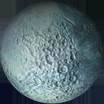
RESISTING THE INCREDIBLE TEMPTATION TO WRITE YET ANOTHER POST ABOUT DUBYA AND HIS P.R. CAMPAIGN ABOUT WHO WON AND LOST THE WAR IN LEBANON, I OFFER THIS UP FOR CONSIDERATION.
 You won't be able to see it, but you know it's there. It's Pluto, the farthest away of the planets recognized by astronomists as part of our solar system.
You won't be able to see it, but you know it's there. It's Pluto, the farthest away of the planets recognized by astronomists as part of our solar system.
The outcast of outcasts on a cosmic scale...and now, apparently, possibly about to become the latest victim of Earth's navel-gazers.
Here's an edited version of the story, which you might have read or heard about already:
Experts' vote could mean demotion for Pluto
Astronomy group to offer definition in 'planet' debate
By Jim Erickson, Rocky Mountain News August 12, 2006
NASA's New Horizons spacecraft is streaking at 43,500 mph toward a 2015 rendezvous with Pluto. When it arrives, will it encounter the solar system's ninth planet or a demoted celestial has-been?
Nearly 3,000 astronomers and planetary scientists from around the globe will gather in Prague,  Czech Republic, next week to answer that question by voting on an official definition of "planet."
Czech Republic, next week to answer that question by voting on an official definition of "planet."
For decades, schoolchildren have learned that nine planets circle the sun. But that number could drop to eight or soar to dozens, depending on the new International Astronomical Union definition.
News leaks about the planet definition began to spout late this week, as the authors prepared to present a draft resolution to the IAU's executive committee Sunday in Prague. The IAU is the official arbiter of all issues related to astronomical nomenclature.
In a story that aired Thursday, unnamed sources told National Public Radio the proposed definition would include Pluto in a new class of small planets. A source also told the Rocky Mountain News on Thursday that a member of the seven-person definition panel said Pluto will remain a planet.
'Just not big enough'
The need for a bulletproof definition gained urgency last year after the discovery of 2003 UB313 - nicknamed Xena - an icy object in the solar system's outer fringes.
Hubble Space Telescope photos show Xena has a diameter of 1,490 miles, give or take 60 miles. Pluto is 1,422 miles across.
If Xena rivals Pluto in size, shouldn't it be classified as a planet? The leader of the discovery team, Caltech's Michael Brown, thought so; he dubbed Xena "the 10th planet."
But others consider Xena, Pluto and their kin as little more than cosmic debris.
Xena and Pluto reside in a band of icy, sun-orbiting bodies beyond Neptune, called the Kuiper Belt. More than 1,000 so-called Kuiper Belt Objects have been discovered since 1992.
One expert's solar system would contain eight planets. Pluto, the faint, far-off iceball discovered by U.S. astronomer Clyde Tombaugh in 1930, would not make the cut. Same for the rest of the Kuiper Belt and all the asteroids, rocky bodies that orbit the sun between Mars and Jupiter.
My question: Should anybody care about this issue, really? Pluto's going to keep being Pluto, whether a bunch of tall forehead astronomers continue to define it as a planet for our purposes or not.
But what if you took the obvious intellect and expertise of all these astronomers and combined it with the best minds from all other fields across the planet we're on, Earth, and applied that brilliance to the issues we actually are facing right now on our own planet?
What if, instead of Bush and Blair and religiously-dominated sects in the Middle East making decisions that affect us all, we had astronomers and physicists and authors and playwrights and bloggers to call upon?
What if we said, yeah, OK, we'll have democratic elections that could result in slippery politicians like Bush, Blair, Canada's Stephen Harper and other nimrods get elected to "lead" their countries.
But that on disputes and issues that could affect the entire planet, such as wars and nuclear weapons and WMDs, the likes of Dubya, and his big business cronies, etc., would be sent away to the North Pole for a while.
And some new global think tank would be brought in, staffed by an appointed or annointed unbiased membership of the best minds on earth from every field imaginable, two per country, to vote on what to do.
Like a United Nations with people with brains and feelings and concern for the common good through common sense and no political, religious or business bent.
No polls, no campaigning, no press releases, no captive news media with its own agenda to present. Just the brightest minds on the planet, the untainted creme de la creme, Earth's best beings, enforcing just law.
I know it sounds outlandish. The question is, could it work? Or do you think the current chaos is just fine? And about Bush: maybe we could just send him on an exploratory trip to Pluto...
.jpg)

